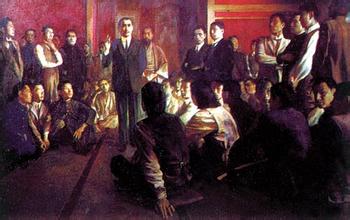(单词翻译:单击)
The Republic of China
中华民国
The Founding of the Tong Meng Hui
同盟会的成立
The rapid development of the revolutionary situation required a national, unified political party to lead the revolutionary movement.
革命形势的快速发展亟需一个全国性的统一政党领导革命运动,
At this point, Sun Yat-sen and Huang Xing amalgamated part of the membership of the Xing Zhong Hui, Hua Xing Hui, Guang Fu Hui, Kexue Buxi Suo and other revolutionary bodies to form the Zhongguo Tong Meng Hui (Chinese Revolutionary League) in Tokyo in August 1905.
值此之际,孙中山和黄兴将兴中会、华兴会、光复会、科学补习所和其他的革命主体的部分成员召集到一起,并于1905年8月在东京成立中国同盟会(中国革命联盟)。
It elected Sun Yat-sen as president, set up an executive group and adopted the programme proposed by Sun Yat-sen to “drive out the Manchus, restore China, establish a republic and equalize landownership”.
孙中山被选为会长,并建立了一个执行团队,遵循其提出的“驱除鞑虏,恢复中华,创立民国,平均地权”的革命纲领。
This programme was spelled out in the manifesto written by Sun Yat-Sen for the first issue of the Tong Meng Hui’s Journal, the Min Bao( People’s Journal) as the Three People’s Principles---- the Principle of Nationalism, the Principle of Democracy, and the Principle of People’s Livelihood.
孙中山在同盟会机关报民报的创刊词中将该项纲领解释为三民主义:民族主义、民主主义和民生主义。
The principle of Nationalism was to overthrow the government of the Manchu Aristocracy.
民族主义指推翻满清政府,
The Principle of Democracy was to overthrow the monarchical autocratic system and establish a republican government.
民主主义指废除君主专制制度,建立共和政府,
The Principle of People’s Livelihood was to appraise and fix land prices, and to apportion to the state the increase in land prices that would result from the development of the social economy after the revolution, and gradually let the state purchase land from landowners.
民生主义指核定地价,将地价的增长分配给国家,这可以使社会经济在革命后得到增长并让国家逐渐收回地主手中的土地。
The Three People’s Principles was a political programme which embodied the hopes of the Chinese bourgeon sie for the establishment of a republic and the development of capitalism, and was a great rallying cry for the revolution at that time.
三民主义的革命纲领,体现了中国人民萌发的对于建立共和国和发展资本主义的渴望,这在当时也成为了革命的伟大口号。
The founding of the Tong Meng Hui and the formation of its programme indicated that the Chinese bourgeois democratic revolutionary movement had entered a new stage.
同盟会的成立和其纲领的形成,标志着中国资产阶级民主革命运动已经进入了一个新阶段。

However, this programme did not raise in clear and definite terms the solvan of anti-imperialist, antifeudal struggle, and did not include a thoroughgoing land programme.
然而,这项纲领没有清晰明确的提出反帝反封建的目标,而且没有包含土地改革的完整计划。
Hence it was a non-thoroughgoing national democratic revolutionary programme reflecting the weak and compromising character of the Chinese national bourgeoisie.
因此这是一次不彻底的民族民主革命,反映了中国民族资产阶级的软弱和妥协的性格。
The activities of the Tong Meng Hui had two main aspects, the debates with the reformists on political ideology and the development of a series of armed uprisings.
同盟会的活动主要在两个方面,一方面与改良主义的政治理念展开论战,另一方面发展一系列武装起义。


